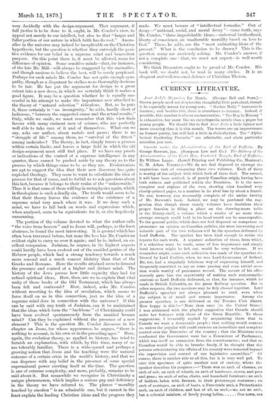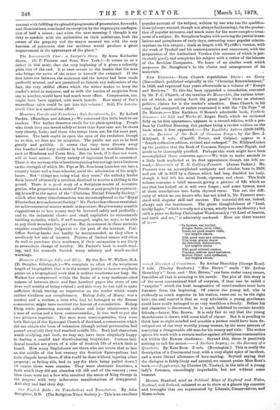Canada under the Administration of the Earl of Dufferin. By
George Stewart, jun. (Sampson Low and Co.) The History of the Administration of the Right Hon. Frederick Temple, Earl of Dufferin. By William Legge. (Lovell Printing and Publishing Co., Montreal ; G. M. Adam, Toronto.)—We do not feel disposed to attempt the ungracious task of comparing these two volumes. Each of them is worthy of the subject with which both of them deal. The second, it will have been noticed, is of purely Canadian origin, having been both written and published within the Dominion. It is the more complete and copious of the two, showing nine hundred very closely-printed pages, to a number in its rival less by about a fourth. No one, however, can reasonably complain of the undue brevity of Mr. Stewart's book. Indeed, we may be pardoned the sug- gestion that though these stately volumes have doubtless their proper function in filling a place on the drawing-room table or the library-shelf, a volume which a reader of no more than average strength could hold in his hand would not be unacceptable. To the general public, which does not feel disposed or competent to pronounce an opinion on Canadian politics, the most interesting and valuable part of the two volumes will be the speeches delivered by Lord Dufferin. The speaker has been kind enough to revise the reports for each work. A separate collection of these, from which, if a selection must be made, some of less importance and simply local interest might be left out, would be very welcome. If we remember aright, some such collection was made of the speeches de- livered by Lord Carlisle, when he was Lord-Lieutenant of Ireland. He, too, had a singularly felicitous way of expressing himself, and frequently contrived to say on some passing and even trivial occa- sion words werthy of permanent record. The nature of his office scarcely gave him the opportunity of making each statesmanlike orations as Lord Dufferin delivered, as that, for instance, which he made in British Columbia, on the great Railway question. But in other respects, the two speakers may be fitly classed together. Lord Dufferin's speeches are always pleasant to read, even when the subject is of small and remote importance. Among the greater speeches, is one delivered at the Toronto Club dinner. How happy is this !—" More than once [in the United States] I was addressed with the playful suggestion that Canada should unite her fortunes with those of the Great Republic. To these suggestions, I invariably replied by acquainting them that in Canada we were a democratic people; that nothing would content us, unless the popular will could exercise an immediate and complete control over the Executive of the country ; that the Ministers who conducted the Government were but a Committee of Parliament, which was itself an emanation from the constituencies ; and that no Canadian would be able to breathe freely, if he thought that the persons administering the affairs of his country were removed beyond the supervision and control of our legislative assemblies." Of course, there is another side to all this, but it is very well put. To take this specimen of quite another sort of oratory, where the speaker describes his progress :—" There was an arch of cheeses, an arch of salt, an arch of wheels, an arch of hardware, stoves, and pots and pans ; an arch of sofas, chairs, and household furniture; an arch of ladders, laden with firemen, in their picturesque costumes ; an arch of carriages, an arch of boats, a Free-trade arch, a Protectionist arch, an arch of children, and last of all, an arch,—no, not an arch,
but a celestial rainbow, of lovely young ladies One town, not content with fulfilling its splendid programme of processions, fireworks, and illuminations, concluded its reception by the impromptu conflagra- tion of half a street ; and when the next morning I thought it my duty to condole with the authorities on their misfortune, both the owner of the property and the mayor assured me, with the very heroism of politeness, that the accident would produce a great improvement in the appearance of the place."



































 Previous page
Previous page